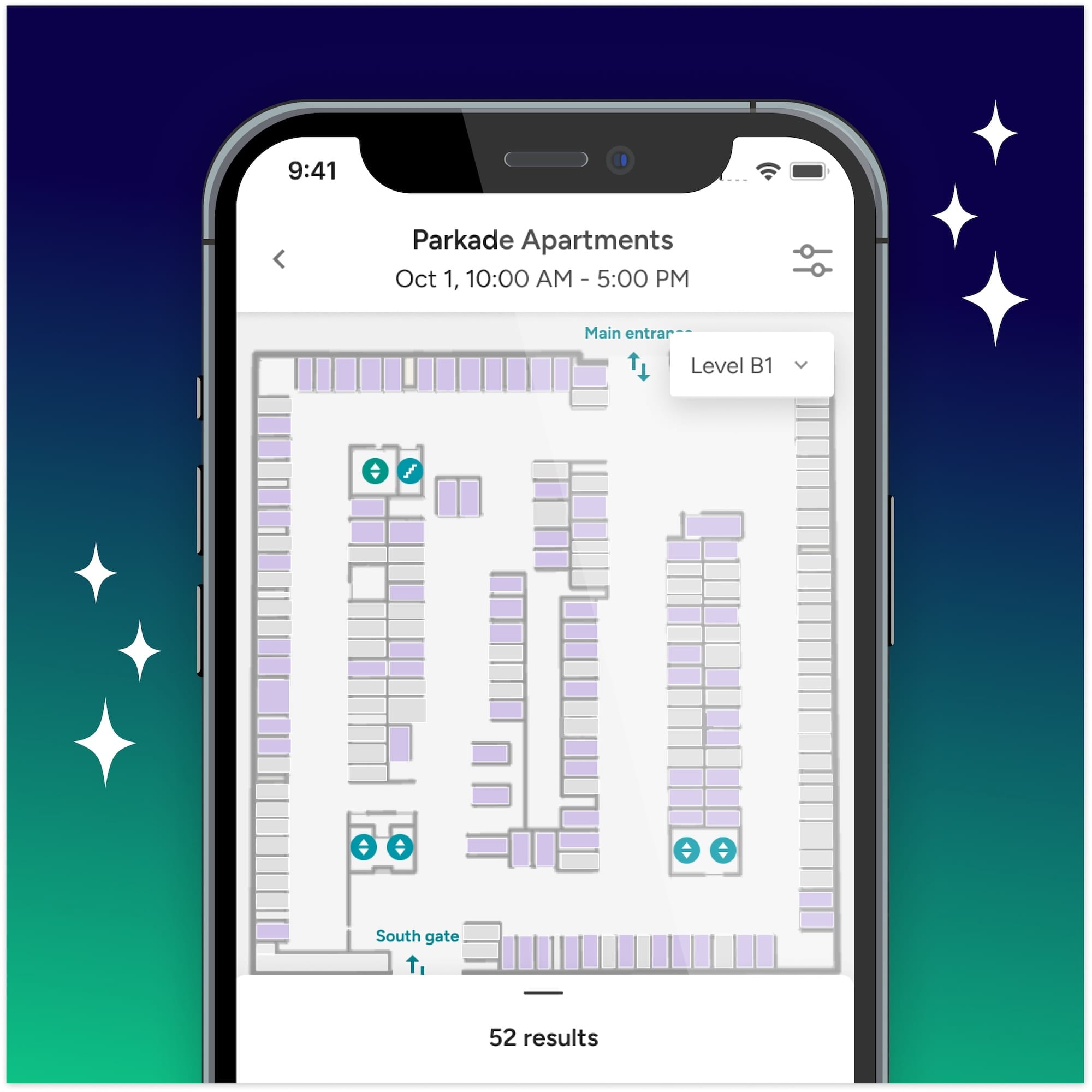

TABLE OF CONTENTS
As parking becomes increasingly valuable in urban areas, property owners and managers are looking for unique ways to boost their ancillary revenue streams (and ultimately to bump up their overall NOI). If you’re already maximizing revenue by charging for resident parking and subleasing, it might be time to think bigger.
Going beyond resident leases by partnering with local businesses can help you unlock new revenue sources––and as a bonus, you can meet the needs of the community around you.
Parking occupancy rates fluctuate depending on the time of day, week, or season, leaving many spaces underutilized. By expanding beyond the traditional resident parking model, you can meet this demand and transform unused spots into steady revenue streams.
Sure, long-term parking for residents is where you’re going to generate the most consistent income, but if you aren’t offering other types of parking, you’re limiting your revenue potential and leaving core resident needs unmet.
The traditional approach –– offering only long-term resident parking in your lot –– leaves spaces empty between leases and during periods where residents aren’t using the space (like vacation or work days, for example). Instead, a flexible parking lot can cater to a broader audience, from office employees to shoppers and event-goers.
In many urban areas, there’s a growing demand for flexible parking options.
With trends like ride-sharing, short-term rentals, and higher traffic from visitors, having adaptable parking solutions can give you a competitive edge. Offering spaces to non-residents can also better align with changing urban lifestyles.
Expanding into flexible parking models brings clear financial advantages. Leasing out extra spots could add substantial yearly revenue, especially when accounting for peak pricing or partnerships with local businesses.
Every extra spot rented brings a potential revenue increase, which can quickly add up. If you rent out just 5 short-term spots at $1/hour for 10 hours per week, this modest change can help you rake in $2,600 for the year.
If you have unused parking spaces or the ability for residents to sublease during peak hours (more on that below), partnering with local businesses can prove mutually beneficial.
Here are several ways to explore these partnerships.
In urban areas, finding parking for employees is a common pain point.
The issues illustrated by the Reddit user below are far too common for employees at an office in a busy part of town.

Some companies, like Lyft, have taken steps to address this, but others may have too few or no parking spots available for their staff.
By offering a block of parking spots for offices to rent for employee use, you can fill empty spaces consistently. Alternatively, with the right parking management system in place, you could sublease spaces directly to employees who may prefer a more flexible rental option.
Parking is a major contributor to customer experience for brick and mortar places of business. That makes local businesses like restaurants, stores, and gyms ideal partners for short-term, customer-focused parking rentals.
Partnering with them allows you to provide parking during high-traffic times, helping you generate revenue from otherwise empty spaces. These short-term rentals are perfect for local businesses needing temporary customer parking.
Local events, sports games, and festivals bring high parking demand. Renting out spaces during these high-traffic times with event-based pricing allows you to charge premium rates, making the most of limited parking availability.
For example, a partnership between our customer Strata and Venue and the San Francisco Giants transformed game days into a significant revenue opportunity for the property. By enabling public parking in certain areas on game days, Strata and Venue allows fans to pre-book pricing at higher rates than what the property charges residents and guests for the same spot.
It’s a win/win. Event goers get access to affordable parking when compared to the other options around, and the property is able to put their empty spaces to good use and make a decent chunk of change.
To make these partnerships and flexible rentals work smoothly, technology plays a vital role. If your parking management system is already causing you headaches — especially if you’re manually updating a spreadsheet — you probably feel like it would be impossible to manage any kind of public parking scenario. From pricing to data accuracy to giving parkers an easy way to book on-the-go, picking the right solution can make or break your monetization strategy.
A full-service parking management solution is built to streamline all aspects of managing a residential parking lot –– including renting out empty spaces to the public, if desired. With Parkade, for instance, property managers can enable visitors and public parkers to book and pay for vacant parking spots through their phones.

This boosts utilization and revenue by making it possible for guests to book at the last minute, and management can conveniently access reservation and vehicle information at any time.
Demand for parking fluctuates based on the time of day, week, or even the season. Using dynamic pricing tools allows you to adjust prices in real time based on these variables, optimizing revenue. For instance, you could charge higher rates for parking during high-demand events or rush hours. And you could lower prices during slow hours to help incentivize more parking traffic during those lulls.
As a property manager, you may be thinking, “that sounds like a dream, but I’m already overwhelmed with parking as it is.” We’ve heard horror stories over and over again of the pains of even managing just long-term parking for guests. But we’ve also heard the incredible sighs of relief from customers when we have them countless hours of time per week.
If you’re managing your parking in a spreadsheet or even pen and paper right now, what if we told you that you could monetize your parking in the same amount of time as or even less than the time it takes you to manage long-term parking now, with the help of Parkade?
In addition to pricing tools, with Parkade’s parking system you will:
Check out this quick, interactive page to see how Parkade works, and how it can solve your biggest parking problems.
.jpg)
As parking management becomes increasingly digital, security becomes critical — and we’re excited to share that we've achieved a major security milestone.
Read Story
We’re thrilled to announce one of our most significant leaps forward this year: the launch of dynamic maps across our mobile and web applications.
Read Story
Now that AB 1317 is official, it’s time to brush up on the requirements and see how your properties stand to benefit.
Read Story